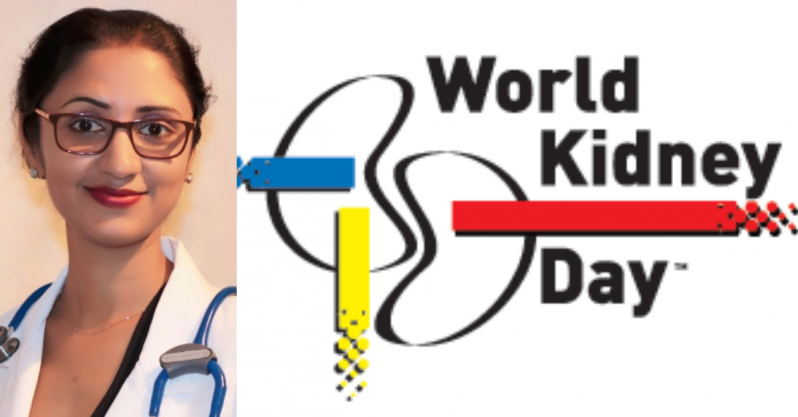By Dr. Areefa Alladin, Chair of the KFG
THERE is a high burden of kidney disease, and disparities that exist globally, in kidney care. This year, the theme for World Kidney Day (WKD) is Kidney Health for All, challenging the issue of bridging the gap in the global understanding of kidney disease and its health literacy. Regardless of where we live, kidney health should be a priority.
There are poor outcomes associated with kidney failure which bring a concomitant growing burden to persons affected, their families and care givers, and the community at large. For kidney care to improve, we need to improve the education of the population. Health literacy is defined as the degree to which persons and organisations enable themselves or individuals with the ability to find, understand, and use information and services to inform health-related decisions and actions for themselves and others. Improving health literacy largely rests with healthcare providers communicating and effectively educating those with kidney disease.
For example, most people are not aware of what kidneys are for or even where their kidneys are located. When these persons become afflicted by disease and the subsequent effects on overall health, an effective healthcare provider communication is required to support individuals to be able to understand what to do, to make decisions, and to take action. Persons will make the right decisions for themselves when they are educated about their condition and available options. Empowering patients is an essential part of healthcare delivery.
Health literacy involves more than functional abilities of an individual; it is also the cognitive and social skills needed to gain access to, understand, and use information to manage health condition. Thus why the imperatives around health literacy are now recognised as indicators for the quality of local and national healthcare systems and healthcare professionals within it. For chronic kidney disease (CKD), as the disease progresses alongside other health changes and increasing treatment complexities, it becomes more difficult for individuals to manage. Therefore, current approaches need to be shifted forward towards patient education and empowerment. Low health literacy in people with CKD has been demonstrated to be associated with poor CKD knowledge, poor self-management behaviours, and reduced quality of life.
The KFG recognises that it takes a nation to improve kidney care and there must be interactions among individuals, healthcare providers, and health policy-makers. KFG is partnering with several governmental and non- governmental organisations such as the Ministry of Health, the Pan American Health Organization (PAHO) and the Georgetown Public Hospital Corporation (GPHC) to bridge the gap in understanding kidney disease and its health literacy. Priority areas include providing educational materials for patients and families across the country; educational and training sessions for patients and medical professionals on kidney diseases and dialysis; and producing a nutrition booklet for Guyanese to promote healthy diets.
Non-physician healthcare workers, including nurses, dietitians, pharmacists, social workers, and other allied health professionals, serve an important role in the care of persons with kidney disease as they spend more time with these patients during encounters. There are many opportunities for care providers to educate patients with kidney diseases. Patients are encouraged to ask questions and to have discussions with their healthcare team. The Health Centres can help identify those with, or at risk of developing, CKD and can initiate educating those persons and their family members about the role of diet and lifestyle modification for prevention of CKD. They can also identify and manage risk factors such as diabetes and hypertension which can lead to preservation of kidney function.
The KFG continues its mission to educate and sensitize Guyanese about the kidney, how it is affected by diseases, and how to maintain healthy kidneys. Health literacy, the main mission of KFG, is well themed into this year’s WKD message. Educational materials such as pamphlets, media print, articles and interviews with patients, families and healthcare providers are being circulated for WKD. These can be found on our social media pages (Facebook page – GuyanaKidneyFoundation).
This year, the Joint Steering Committee of WKD declares “Kidney Health for All” as the theme to emphasise and extend collaborative efforts among people with kidney disease, their care partners, healthcare providers, and all involved stakeholders, for elevating education and awareness on kidney health and saving lives of persons with this disease. Guyanese are encouraged to be proactive in their kidney care. Everyone can make changes to better care for themselves and their kidneys.
Be an active participant in your care. Work with your health care team to create a treatment plan that fits your lifestyle, mobility, health status, and dietary needs.
Follow your care plan. Take medicine as prescribed and stay up-to-date on vaccines. The COVID-19 and flu vaccines are especially important for people with kidney disease, who may be more likely to get sicker from COVID-19 or the flu.
Build a kidney healthy lifestyle. Try to incorporate healthy habits into your daily schedule. This can include healthy foods and beverages you enjoy, physical activity like walking or taking the stairs to help you stay active and manage your weight, and a sleep routine that allows you to get 7 to 8 hours of sleep at night. Take steps to quit smoking and limit alcohol.
The kidney communities, globally, strive to prevent kidney diseases and enable living well with kidney disease.
(Adapted from WKD 2022 and NIDDK.nih.gov)


.jpg)











